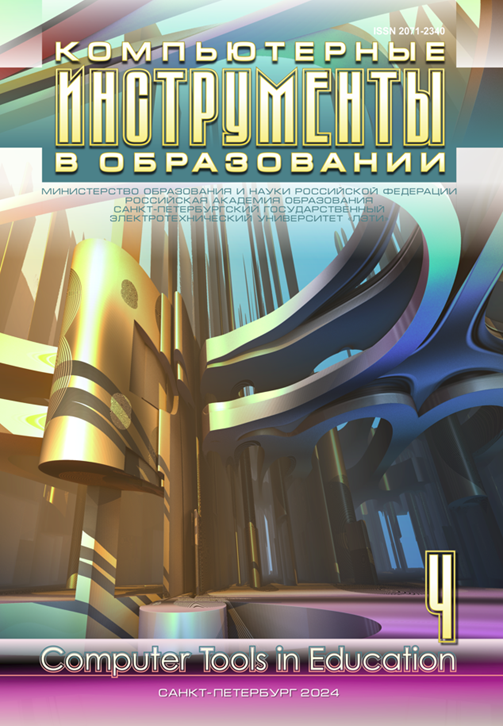Разработка и внедрение платформы отслеживания оценки процесса самостоятельного обучения на основе блокчейна
Аннотация
В этом исследовании изучалось практическое применение технологии блокчейн для оценки результатов обучения. Основное внимание уделялось разработке и внедрению платформы для прослеживаемости процесса самостоятельного обучения учащихся. Результаты исследования показывают, что неизменяемость и прослеживаемость блокчейна обеспечивают подлинность и прозрачность процесса оценки. В то же время многосубъектный децентрализованный механизм участия эффективно снижает влияние субъективных суждений, повышая достоверность результатов оценки. Это приложение не только открывает возможности для использования технологии блокчейн в образовательной сфере, но и предоставляет новые теоретические модели и технические пути для оценки образовательных результатов, способствуя информатизации образования.
Литература
D. Lombardi et al., “The curious construct of active learning,” Psychological Science in the Public Interest, vol. 22, no. 1, pp. 8–43, 2021; doi:10.1177/1529100620973974
S. Yan and Y. Yang, “Education informatization 2.0 in China: Motivation, framework, and vision,” ECNU Review of Education, vol. 4, no. 2, pp. 410–428, 2021; doi:10.1177/2096531120944929
B. J. Zimmerman, D. Greenberg, and C. E.Weinstein, “Self-regulating academic study time: A strategy approach,” in Self-regulation of learning and performance: Routledge, pp. 181–199, 2023.
W. Yi, J. Chen and Y. Luo, “Factors in the Development of Active Learning Skills of Successful Software Students,” Computer tools in Education, no. 3, pp. 81–100, 2023; doi:10.32603/2071-2340-2023-3-81-100
E. Dimitriadou and A. Lanitis, “A critical evaluation, challenges, and future perspectives of using artificial
intelligence and emerging technologies in smart classrooms,” Smart Learning Environments, vol. 10, no. 1, pp. 1–26, 2023; doi:10.1186/s40561-023-00231-3
F. Guay, “Applying self-determination theory to education: Regulations types, psychological needs, and autonomy supporting behaviors,” Canadian Journal of School Psychology, vol. 37, no. 1, pp. 75–92, 2022; doi:10.1177/08295735211055355
R. Malhotra, M. Massoudi, and R. Jindal, “Shifting from traditional engineering education towards competency-based approach: The most recommended approach-review,” Education and Information Technologies, vol. 28, no. 7, pp. 9081–9111, 2023; doi:10.1007/s10639-022-11568-6
M. S. Ibarra-Saˊ iz, G. Rodrıˊ guez-Goˊ mez, and D. Boud, “Developing student competence through peer assessment: the role of feedback, self-regulation and evaluative judgement,” Higher Education, vol. 80, no. 1, pp. 137–156, 2020; doi:10.1007/s10734-019-00469-2
F. T. M. Ayasrah, A. Shdouh, and K. Al-Said, “Blockchain-based student assessment and evaluation: a secure and transparent approach in jordan’s tertiary institutions,” Kurdish Studies, vol. 11, no. 2, pp. 2036–2049, 2023; doi:10.58262/ks.v11i02.144
Y.Wang et al., “Research on the Construction of Student Learning Effect Traceability System from the Perspective of Blockchain,” Forest Chemicals Review, pp. 250–260, 2021.
N. Elisa et al., “A framework of blockchain-based secure and privacy-preserving E-government system,” Wireless networks, vol. 29, no. 3, pp. 1005–1015, 2023; doi:10.1007/s11276-018-1883-0
C. Thapa and S. Camtepe, “Precision health data: Requirements, challenges and existing techniques for data security and privacy,” Computers in biology and medicine, vol. 129, p. 104130, 2021; doi:10.1016/j.compbiomed.2020.104130
Y. Zheng, “Design of a blockchain-based e-portfolio evaluation system to assess the education and teaching process,” International Journal of Emerging Technologies in Learning (iJET), vol. 16, no. 5, pp. 261–280, 2021; doi:10.3991/ijet.v16i05.21081
J. Zhong et al., “A blockchain model for word-learning systems,” in Proc. of 2018 5th international conference on Behavioral, Economic, and Socio-Cultural Computing (BESC), pp. 130–131, 2018; doi:10.1109/besc.2018.8697299
Z. Wenhua et al., “Blockchain technology: security issues, healthcare applications, challenges and future trends,” Electronics, vol. 12, no. 3, p. 546, 2023; doi:10.3390/electronics12030546
T. Wahyuningsih, F. P. Oganda, and M. Anggraeni, “Design and implementation of digital education resources blockchain-based authentication system,” Blockchain Frontier Technology, vol. 1, no. 01, pp. 74–86, 2021; doi:10.34306/bfront.v1i01.19
W. Yi et al., “Weighted Attribute-Based Proxy Re-Encryption Scheme with Distributed Multi-Authority Attributes,” Sensors, vol. 24, no. 15, pp. 4939, 2024.
W. Yi et al., “Blockchain-based approach to achieve credible traceability of agricultural product transactions,” Journal of Physics: Conference Series, vol. 1864, no. 1, pp. 1–4, 2021; doi:10.1088/1742-6596/1864/1/012115
A. S. Al-Adwan et al., “Novel extension of the UTAUT model to understand continued usage intention of learning management systems: the role of learning tradition?” Education and Information Technologies, no. 27, pp. 3567–3593, 2022; doi:10.1007/s10639-021-10758-y
J. D. Swerzenski, “Critically analyzing the online classroom: Blackboard, moodle, canvas, and the pedagogy they produce,” Journal of Communication Pedagogy, no. 4, pp. 51–69, 2021; doi:10.31446/ JCP.2021.1.05
W. Yi et al., “Knowledge Graph-Based Computer Aided Adaptive Learning,” in Proc. 2022 10th International
Conference on Information Systems and Computing Technology (ISCTech), Guilin, China, pp. 398– 401, 2022.
M. Javaid et al., “A review of Blockchain Technology applications for financial services,” BenchCouncil Transactions on Benchmarks, Standards and Evaluations, vol. 2, no. 3, pp. 100073, 2022; doi:10.1016/ j.tbench.2022.100073
K. Duan, G. Pang, and Y. Lin, “Exploring the current status and future opportunities of blockchain technology adoption and application in supply chain management,” Journal of Digital Economy, vol. 2, pp. 244–288, 2023.
Y. Zhao et al., “Agricultural IoT data storage optimization and information security method based on blockchain,” Agriculture, vol. 13, pp. 274, 2023; doi:10.3390/agriculture13020274
S. Jani, “Smart contracts: Building blocks for digital transformation,” Indira Gandhi National Open University, pp. 1–14, 2020.
H. Tang et al., “Improved Raft Algorithm for Optimizing Authorized Nodes Based on Random Forest,” in Proc. of 2022 XXV International Conference on Soft Computing and Measurements (SCM), Saint Petersburg, Russia pp. 279–282, 2022.
Материал публикуется под лицензией:








